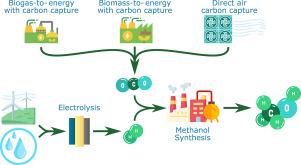使用可再生氢气和二氧化碳原料的甲醇合成装置的技术经济分析和生命周期评价
IF 10.9
1区 工程技术
Q1 ENERGY & FUELS
引用次数: 0
摘要
本文介绍了合成甲醇生产的从摇篮到gate的技术经济分析(TEA)和生命周期评估(LCA),利用低碳电解氢和可再生二氧化碳从生物质或沼气驱动的生物能源中捕获(BEC)或直接空气捕获(DAC)设施。使用详细的化学过程模型和全面的现金流分析,我们使用综合方法评估可再生甲醇生产工厂的质量和能源需求,该方法结合了规模效应、原料和能源价格、过程排放和其他几个变量。在基线情景中,绿色甲醇生产总成本的摊销显示,当二氧化碳来自生物质BEC、沼气BEC和DAC时,燃料(LCOF)的平准化成本分别为每公斤甲醇0.76美元、1.19美元和1.06美元。从这个基线出发,使用敏感性分析来考虑这些结果对工厂/生产规模和原料/能源成本的依赖性,并将研究结果推广到广泛的当地市场。这些发现量化了强大的规模经济,其中沼气BEC的甲醇在小产量下是最佳的,但当产量接近每天1000吨甲醇时,生物质BEC最终会受到青睐。研究结果还显示,如果未来氢气价格能够低于1.50美元/公斤,那么就会有巨大的机会。虽然基线TEA表明,目前考虑的可再生甲醇合成工艺具有70%或更多的绿色溢价,但LCA显示,与传统方法相比,每千克甲醇可减少2.6-3.3千克二氧化碳-e。总体而言,本研究量化了与低碳甲醇生产相关的显著经济挑战和可观的环境激励,这可以为未来化工行业的脱碳工作提供信息。本文章由计算机程序翻译,如有差异,请以英文原文为准。

Techno-economic analysis and life-cycle assessment of methanol synthesis plants using renewable hydrogen and carbon dioxide feedstocks
This paper presents a cradle-to-gate techno-economic analysis (TEA) and life-cycle assessment (LCA) of synthetic methanol production leveraging low-carbon electrolytic hydrogen and renewable CO2 captured from biomass- or biogas-powered bioenergy with capture (BEC) or direct air capture (DAC) facilities. Using a detailed chemical process model and a comprehensive cash flow analysis, we evaluate the mass and energy requirements for renewable methanol production plants using an integrated approach that couples scale effects, feedstock and energy prices, process emissions, and several other variables. In the baseline scenario, amortization of the total green methanol production costs reveals levelized costs of fuel (LCOF) equal to $0.76, $1.19, and $1.06 per kg of methanol when CO2 is sourced from biomass BEC, biogas BEC, and DAC, respectively. From this baseline, sensitivity analysis is used to consider the dependence of these results upon plant/production scale and feedstock/energy costs and generalize findings to a broad range of local markets. These findings quantify strong economies of scale where methanol from biogas BEC is optimal at small production volumes, but where biomass BEC eventually becomes favored as production volumes approach 1000 tonnes of methanol per day. The findings also reveal significant opportunities if future H2 prices below $1.50/kg can be attained. While the baseline TEA indicates that the considered renewable methanol synthesis process currently carries a green premium of 70% or more, the LCA reveals dramatic GHG reductions equal to 2.6-3.3 kg of CO2-e per kg of methanol relative to conventional methods. Overall, this research quantifies both a notable economic challenge and a considerable environmental incentive associated with low-carbon methanol production, which could inform future decarbonization efforts in the chemicals industry.
求助全文
通过发布文献求助,成功后即可免费获取论文全文。
去求助
来源期刊

Energy Conversion and Management
工程技术-力学
CiteScore
19.00
自引率
11.50%
发文量
1304
审稿时长
17 days
期刊介绍:
The journal Energy Conversion and Management provides a forum for publishing original contributions and comprehensive technical review articles of interdisciplinary and original research on all important energy topics.
The topics considered include energy generation, utilization, conversion, storage, transmission, conservation, management and sustainability. These topics typically involve various types of energy such as mechanical, thermal, nuclear, chemical, electromagnetic, magnetic and electric. These energy types cover all known energy resources, including renewable resources (e.g., solar, bio, hydro, wind, geothermal and ocean energy), fossil fuels and nuclear resources.
 求助内容:
求助内容: 应助结果提醒方式:
应助结果提醒方式:


